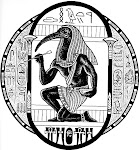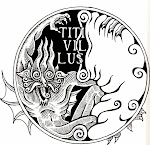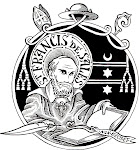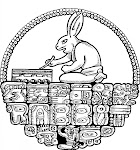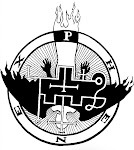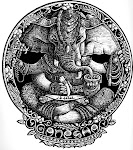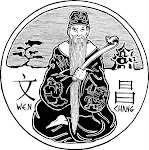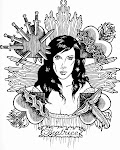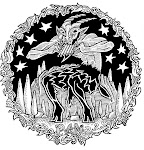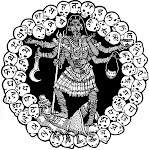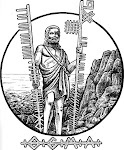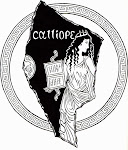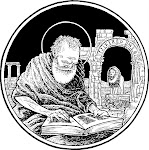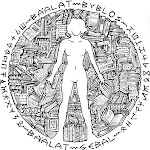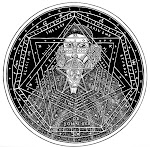 Then the voice said aloud to him, “When you are arrived at Palodes, take care to make it known that the great God Pan is dead.” Epitherses told us this voice did much astonish all that heard it, and caused much arguing whether this voice was to be obeyed or slighted.
Then the voice said aloud to him, “When you are arrived at Palodes, take care to make it known that the great God Pan is dead.” Epitherses told us this voice did much astonish all that heard it, and caused much arguing whether this voice was to be obeyed or slighted.— Plutarch, The Morals
Oh, wise Plutarch, the voice lied! All these centuries of mourning, a dreamless age, all sparked by a misapprehension, a falsehood, a monstrous hysteria. Why was this voice given credence, calling from the devious shores of Paxi, summoning that obscure Egyptian, Thamus, to report to the world the death of Pan? Why did Thamus proclaim the sinister news to the heartbroken Palodeans? If only he had held his tongue! If only that fire of innuendo, speculation, and gossip had not been lit, leaping from ship to shore and from village to city until the arson rumor burned into the very ears of the Emperor, filling the years with blinding smoke. Some say Epitherses heard the voice himself. Others say they heard the report from Epitherses’ son, the orator Aemilianus, and still others heard it from Cleombrotus, that superstitious fool, who believed Saturn himself could be held prisoner by daemons.
Pan is alive. Again and again, the poets have seen him, since the inspired days of Pindar, the first poet who sighted Pan when the god was an attendant of Cybele, the Earth Mother. Surely poets’ words hold more power than accounts from Thamus the dupe or Cleombrotus the scandalmonger? Of course I don’t include those credulous scribes like Elizabeth Barrett Browning, who wrote “The Dead Pan” in 1844, perpetuating two thousand years of grief:
Gods of Hellas, gods of Hellas,
Can ye listen in your silence?
Can your mystic voices tell us
Where ye hide? In floating islands,
With a wind that evermore
Keeps you out of sight of shore?
Pan, Pan is dead.
Pan is alive. In fact, by the nineteenth century he held communion with poets more often than he had since his golden age in Arcadia, when the goat-footed god taught Apollo the art of prophecy, and he ruled the fields and forests, honoured by shepherds in the hills and theatre critics in the cities. In those ancient days Pan inspired erotic joy and thrilling fear, playing his supple flute, crafted from the body of Syrinx, the beauty who escaped the god’s passion by transforming into a reed. His music, still heard in hushed forests, in secret clearings and abandoned groves, aroused John Keats to celebrate the god in Endymion: A Poetic Romance (1818). Counting himself among “many that are come to pay their vows”, Keats affirms the potency of the “satyr king”:
Strange ministrant of undescribed sounds,
Pan is alive. In fact, by the nineteenth century he held communion with poets more often than he had since his golden age in Arcadia, when the goat-footed god taught Apollo the art of prophecy, and he ruled the fields and forests, honoured by shepherds in the hills and theatre critics in the cities. In those ancient days Pan inspired erotic joy and thrilling fear, playing his supple flute, crafted from the body of Syrinx, the beauty who escaped the god’s passion by transforming into a reed. His music, still heard in hushed forests, in secret clearings and abandoned groves, aroused John Keats to celebrate the god in Endymion: A Poetic Romance (1818). Counting himself among “many that are come to pay their vows”, Keats affirms the potency of the “satyr king”:
Strange ministrant of undescribed sounds,
That come a swooning over hollow grounds,
And wither drearily on barren moors:
Dread opener of the mysterious doors
Leading to universal knowledge …
And indeed many others paid their vows, including Percy Bysshe Shelley with “Hymn of Pan” (1824), Oscar Wilde with “Pan—Double Villanelle” (1913), Bliss Carman with his five-volume Pipes of Pan series of poems (1902-1905), as well as famous depictions in prose, such as the momentous chapter entitled “The Piper at the Gates of Dawn” in Kenneth Grahame’s classic tale, The Wind in the Willows (1908). Reading Grahame, I wonder whether Pan himself may have played a role in cultivating the myth of his demise, perhaps in an effort to protect those mortals who have been fortunate enough to experience his presence:
“For this is the last best gift that the kindly demi-god is careful to bestow on those to whom he has revealed himself in their helping: the gift of forgetfulness. Lest the awful remembrance should remain and grow, and overshadow mirth and pleasure, and the great haunting memory should spoil all the after-lives of little animals helped out of difficulties, in order that they should be happy and light-hearted as before.”
Not everyone forgets. I have heard his music myself, echoing through the halls of the Writer’s Pantheon. Pan is alive. The poets have heard him too, and they remember, for truly they are the Children of Pan:
The Poets
By Archibald Lampman (1888)
Half god, half brute, within the self-same shell,
And indeed many others paid their vows, including Percy Bysshe Shelley with “Hymn of Pan” (1824), Oscar Wilde with “Pan—Double Villanelle” (1913), Bliss Carman with his five-volume Pipes of Pan series of poems (1902-1905), as well as famous depictions in prose, such as the momentous chapter entitled “The Piper at the Gates of Dawn” in Kenneth Grahame’s classic tale, The Wind in the Willows (1908). Reading Grahame, I wonder whether Pan himself may have played a role in cultivating the myth of his demise, perhaps in an effort to protect those mortals who have been fortunate enough to experience his presence:
“For this is the last best gift that the kindly demi-god is careful to bestow on those to whom he has revealed himself in their helping: the gift of forgetfulness. Lest the awful remembrance should remain and grow, and overshadow mirth and pleasure, and the great haunting memory should spoil all the after-lives of little animals helped out of difficulties, in order that they should be happy and light-hearted as before.”
Not everyone forgets. I have heard his music myself, echoing through the halls of the Writer’s Pantheon. Pan is alive. The poets have heard him too, and they remember, for truly they are the Children of Pan:
The Poets
By Archibald Lampman (1888)
Half god, half brute, within the self-same shell,
Changers with every hour from dawn till even,
Who dream with angels in the gate of heaven,
And skirt with curious eyes the brinks of hell,
Children of Pan, whom some, the few, love well,
But most draw back, and know not what to say,
Poor shining angels, whom the hoofs betray,
Whose pinions frighten with their goatish smell.
Half brutish, half divine, but all of earth,
Half brutish, half divine, but all of earth,
Half-way ’twixt hell and heaven, near to man,
The whole world’s tangle gathered in one span,
Full of this human torture and this mirth:
Life with its hope and error, toil and bliss,
Earth-born, earth-reared, ye know it as it is.
Sources
Elizabeth Barrett Browning. “The Dead Pan”
Sources
Elizabeth Barrett Browning. “The Dead Pan”
http://books.google.ca/books?lpg=PA320&dq=the+dead+pan+elizabeth+barrett+browning&pg=PA320&id=24gNAAAAYAAJ&ots=_38xdGl_j9&output=html (accessed 5 June 2009)
Bliss Carman. Pipes of Pan
http://www.canadianpoetry.ca/confederation/Bliss%20Carman/index.htm (accessed 5 June 2009)
Kenneth Grahame. The Wind in the Willows (Chapter 7: “The Piper at the Gates of Dawn”) Project Gutenberg
http://www.gutenberg.org/files/27805/27805-h/27805-h.htm#VII (accessed 5 June 2009)
John Keats. “Endymion: A Poetic Romance” Project Gutenberg
http://www.gutenberg.org/files/24280/24280-h/24280-h.htm (accessed 5 June 2009)
John Keats. “Hymn to Pan”
http://www.poetry-love-poems.com/keats/hymn-to-pan.php (accessed 5 June 2009)
Archibald Lampman. “The Poets”
http://www.canadianpoetry.ca/confederation/Archibald%20Lampman/among_the_millet/the_poets.htm (accessed 5 June 2009)
“Moralia” Wikipedia
http://en.wikipedia.org/wiki/Moralia (accessed 5 June 2009)
“Pan (mythology)” Wikipedia
http://en.wikipedia.org/wiki/Pan_(mythology) (accessed 5 June 2009)
“Pindar” Wikipedia
http://en.wikipedia.org/wiki/Pindar (accessed 5 June 2009)
Plutarch’s Morals. Translated from the Greek by Several Hands. Corrected and Revised by William W. Goodwin, with an Introduction by Ralph Waldo Emerson. 5 Volumes. (Boston: Little, Brown, and Co., 1878). Vol. 4.
http://oll.libertyfund.org/?option=com_staticxt&staticfile=show.php%3Ftitle=1214&chapter=92414&layout=html&Itemid=27 (accessed 5 June 2009)
“Poems to Pan” The Great God Pan
http://thegreatgodpan.londonpaganjubilation.com/poemstopan.html
Percy Bysshe Shelley. “Hymn of Pan” Representative Poetry Online
http://rpo.library.utoronto.ca/poem/1889.html (accessed 5 June 2009)
Oscar Wilde. “Pan—Double Villanelle” Read Print
http://www.readprint.com/work-6424/Pan-Double-Villanelle-Oscar-Wilde (accessed 5 June 2009)
Bliss Carman. Pipes of Pan
http://www.canadianpoetry.ca/confederation/Bliss%20Carman/index.htm (accessed 5 June 2009)
Kenneth Grahame. The Wind in the Willows (Chapter 7: “The Piper at the Gates of Dawn”) Project Gutenberg
http://www.gutenberg.org/files/27805/27805-h/27805-h.htm#VII (accessed 5 June 2009)
John Keats. “Endymion: A Poetic Romance” Project Gutenberg
http://www.gutenberg.org/files/24280/24280-h/24280-h.htm (accessed 5 June 2009)
John Keats. “Hymn to Pan”
http://www.poetry-love-poems.com/keats/hymn-to-pan.php (accessed 5 June 2009)
Archibald Lampman. “The Poets”
http://www.canadianpoetry.ca/confederation/Archibald%20Lampman/among_the_millet/the_poets.htm (accessed 5 June 2009)
“Moralia” Wikipedia
http://en.wikipedia.org/wiki/Moralia (accessed 5 June 2009)
“Pan (mythology)” Wikipedia
http://en.wikipedia.org/wiki/Pan_(mythology) (accessed 5 June 2009)
“Pindar” Wikipedia
http://en.wikipedia.org/wiki/Pindar (accessed 5 June 2009)
Plutarch’s Morals. Translated from the Greek by Several Hands. Corrected and Revised by William W. Goodwin, with an Introduction by Ralph Waldo Emerson. 5 Volumes. (Boston: Little, Brown, and Co., 1878). Vol. 4.
http://oll.libertyfund.org/?option=com_staticxt&staticfile=show.php%3Ftitle=1214&chapter=92414&layout=html&Itemid=27 (accessed 5 June 2009)
“Poems to Pan” The Great God Pan
http://thegreatgodpan.londonpaganjubilation.com/poemstopan.html
Percy Bysshe Shelley. “Hymn of Pan” Representative Poetry Online
http://rpo.library.utoronto.ca/poem/1889.html (accessed 5 June 2009)
Oscar Wilde. “Pan—Double Villanelle” Read Print
http://www.readprint.com/work-6424/Pan-Double-Villanelle-Oscar-Wilde (accessed 5 June 2009)
